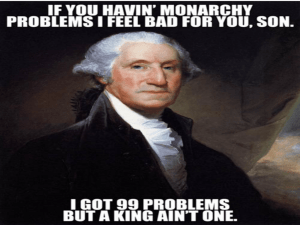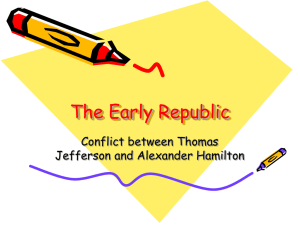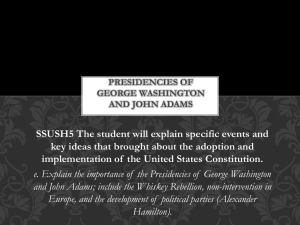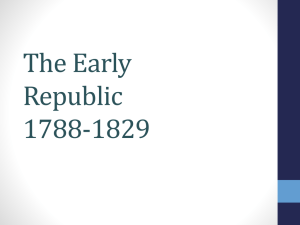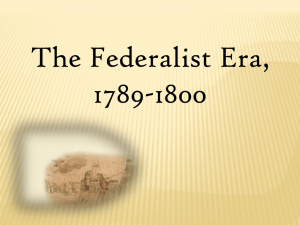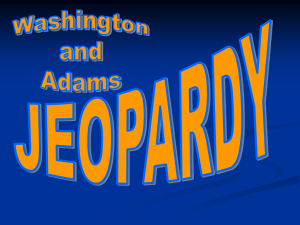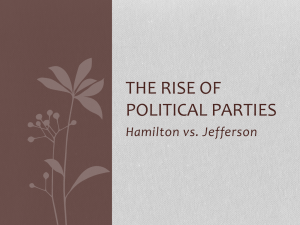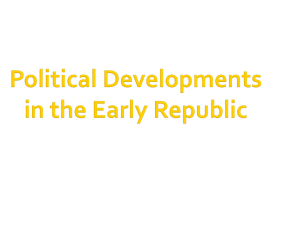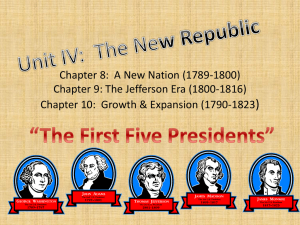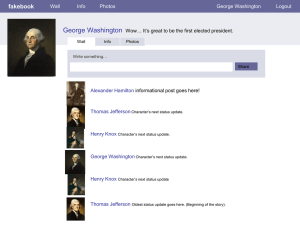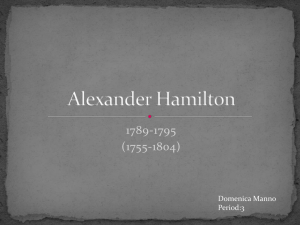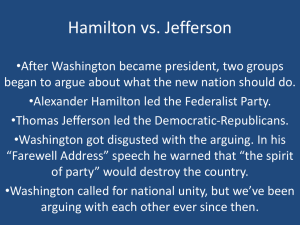Chapter 7 and 8 Review
advertisement
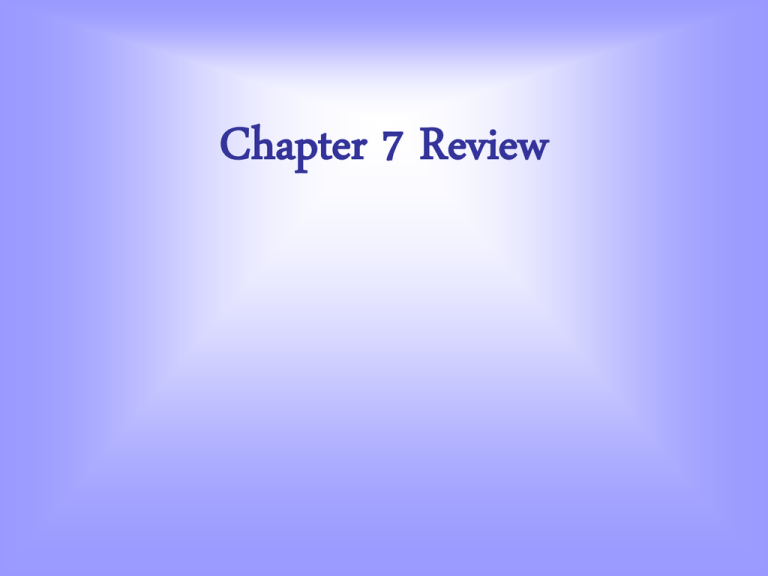
Chapter 7 Review #1 In 1790 most American did NOT expect the government to do which of these? A monitor the economy and pay off the debt B monitor and control trade of both imports and exports C pass fair tax laws, help small businesses and not interfere in daily life D institute the right to settle western lands B monitor and control trade of both imports and exports #2 The new federal government in America took actions that would set an example for the future. In Washington’s words, these exemplary actions “will serve to establish a A procedure” B precursor” C policy” D precedent” D precedent” #3 Which of the following issues did NOT divide Alexander Hamilton and Thomas Jefferson like many other issues would? A how to address the national debt B how to repay the value of bonds C whether or not to move the capital D whether or not to limit the federal government C whether or not to move the capital #4 The national debt can best be defined as the amount of money owed A to the nation by the nation’s citizens and foreign countries B by the nation to the foreign countries and the nation’s citizens C to the federal government by individual states D by the federal government to domestic debtors B by the nation to the foreign countries and the nation’s citizens #5 Alexander Hamilton stood for a loose reading of the Constitution, but Thomas Jefferson stood for A flexible construction B soft construction C strict construction D tight construction C strict construction #6 According to Thomas Jefferson and James Madison, what was the most serious flaw in Alexander Hamilton’s plan for a national bank? A The federal government lacked the authority to create a national bank making the bank unconstitutional. B Keeping the nation’s money in one place would create and unnecessary risk endangering the economy in case of foreign attack C A national bank would put private money lenders out of business giving the federal government a monopoly on granting loans D A national bank would rob the states of power, leading to friction between the states and the federal government. A The federal government lacked the authority to create a national bank making the bank unconstitutional. #7 Which of the following was NOT one of the reasons why Alexander Hamilton wanted a national bank for the United States? A to secure the national economy B to have the money to pay for a national health plan for all its citizens C to provide for a place for the government to keep its money D to make loans to businesses and citizens B to have the money to pay for a national health plan for all its citizens #8 A “protective tariff” adds a tax to the price of imported goods to protect domestic products from foreign A contamination B competition C theft D boycott B competition #9 Alexander Hamilton changed Southerners’ minds about paying war debt by convincing northern members of Congress to move the capital to where? A Boston B New York City C New Orleans D Washington D.C. D Washington D.C. #10 Alexander Hamilton’s vision of a robust economy depended on the contributions of business people and manufacturers but Thomas Jefferson's vision put greater emphasis on A teachers and education B farmers and agriculture C merchants and small business D doctors and healthcare B farmers and agriculture #11 George Washington’s statement that America would not take sides in disputes between warring European countries was called? A the Swiss Pact B the Neutrality Proclamation C the Peace Treaty of 1793 D Pinckney’s Treaty B the Neutrality Proclamation #12 Why did some members of Congress criticize George Washington’s pronouncement about staying out of disputes between European Countries? A They felt the president was overstepping the bounds of his authority and wanted to enforce the separation of powers. B They felt there was a clear favorite in the disputes between France and Great Britain and wanted to express their sympathies. C They felt it would be best for national security if the United States forged clear alliances with foreign countries. D They felt that the president’s idea was sensible, but that the executive branch should have to answer to the legislative branch. A They felt the president was overstepping the bounds of his authority and wanted to enforce the separation of powers. #13 Why did Thomas Jefferson criticize the U.S. policy towards France? A He disagreed with George Washington’s stand on foreign alliances because he believed the new U.S. should use its military power whenever it could B He believed the U.S. owed France support because France had backed the U.S. during the Revolutionary War. C He wanted to undermine Alexander Hamilton’s proBritish stance and reduce his rivals in influence on the president’s foreign policy D He was eager to quit his position in George Washington’s cabinet and saw the French issue as a convenient excuse. B He believed the U.S. owed France support because France had backed the U.S. during the Revolutionary War. #14 Which statement best expresses George Washington’s attitude toward Jay’s Treaty? A He did not like it but believed it was the most that could be done. B He urged the Senate not to approve it in hopes of a better compromise. C He felt it was the best possible solution to the British threat to U.S. neutrality. D He was glad to pay off the country’s preRevolutionary debts to the British A He did not like it but believed it was the most that could be done. #15 Pinckney’s Treaty addressed American settlers’ disputes over the Florida border with which country? A France B Britain C Spain D Mexico C Spain #16 The greatest threat to American expansion into the Northwest Territories was A diseases, such as smallpox and influenza, spread by American Indians B American Indian tribes supplied with guns and ammunition by the British C Americans’ inability to counter attacks on supply lines into the territories D Americans’ inability to cope with harsh winter conditions and inadequate forts B American Indian tribes supplied with guns and ammunition by the British #17 On their march to the western frontier to fight the American Indians many of General Wayne’s troops were afflicted with influenza, a disease of the A B C D esophagus lungs heart bones B lungs #18 How did the Whiskey Rebellion end? A Tax collectors tarred and feathered the rebels before Washington’s army arrived B The rebels hid their stores of whiskey before Washington’s army arrived. C Most of the rebels fled before Washington’s army arrived. D Most of the rebels formed a militia and battled Washington’s Army. C Most of the rebels fled before Washington’s army arrived. #19 President Washington personally led the militia against the westerners in the Whiskey Rebellion because ? A he felt individual farmers should have to pay off the national debt trough taxes B he felt the federal government was owed taxes for providing settlers with protection and opportunities for trade C he felt people needed to understand the Constitutional right of Congress to institute tax laws D he felt the rebellion might spark similar incidents of violence C he felt people needed to understand the Constitutional right of Congress to institute tax laws #20 In George Washington’s farewell address, he did NOT warn against which of the following dangers? A B C D making foreign alliances burdening future generations with debt increasing political conflicts at home maintaining the institution of slavery D maintaining the institution of slavery #21 Which of these slogans might a Federalist have shouted at a party rally? A B C D Central Government over All! States Rule! Power to the People! Jefferson for President! A Central Government over All #22 The presidential election of 1796 differed from prior American elections because there were what? A B C D conventions. debates. multiple candidates. Democrats and Republicans. C multiple candidates. #23 The first political party division in the United States was between who? A B C D Democrats and Republicans Liberal and Conservatives Democrat-Republicans and Federalist Federalist and Royalist C Democrat-Republicans and Federalist #24 How was a vice president chosen in 1796? A He ran alongside the presidential candidate B He was elected by popular vote C He was the presidential candidate who came in second D He was appointed by the president-elect C He was the presidential candidate who came in second #25 Who became vice president as a result of the 1796 election? A B C D Jefferson Adams Madison Hamilton A Jefferson #26 Alexander Hamilton helped found the Federalist Party, which wanted to limit what? A B C D industry trade federal government power state government power D state government power #27 The Republicans took control from the Federalist in 1800 as a result of popular distaste for the Alien and Sedition Acts, which limited all EXECPT which of the following freedom? A B C D speech press expression religion D religion #28 The Alien and Sedition Acts were supported by the Federalist as a way to A protect the country from Republican critics B limit the government power over foreigners and criticize the government C imprison foreigners and journalist D punish French speakers A protect the country from Republican critics #29 Republicans’ main criticism of the Alien and Seditions Acts was that they A gave too much power to the national government and interfered with state government B took too many rights, such as freedom of speech, away from foreigners C went against the American policy of neutrality D forced the press to publish falsehoods A gave too much power to the national government and interfered with state government #30 During the presidency of John Adams, three French agents would discuss a treaty with the U.S. only in exchange for a bribe. The incident came to be known as the A B C D TGIF Talks ABC Incident RST Event XYZ Affair D XYZ Affair #31 Which best describes President John Adams’s attitude toward going to war with France? A He was eager to go to war despite the cost. B He wanted war, but would not declare it without congressional approval. C He thought war might be unavoidable and gave up hope for a treaty. D He refused to go to war despite protests by members of his own party. D He refused to go to war despite protests by members of his own party. #32 The Kentucky and Virginia Resolutions were put forward by which leaders? A B C D Hamilton and Madison Jefferson and Madison Adams and Jefferson Adams and Hamilton B Jefferson and Madison #33 “Loose construction” is best defined as A the idea that the parts of the Constitution need not be interpreted in the context of the whole. B the interpretation that says the federal government can take reasonable actions in special cases as long as they are not specifically forbidden by the Constitution. C the notion that there is an elasticity to the Constitution that allows politicians to stretch it in order to deal with any new situation. D the position that says the Constitution allows only necessary means to deal with new situations and should not be stretched merely because politicians find it convenient. B the interpretation that says the federal government can take reasonable actions in special cases as long as they are not specifically forbidden by the Constitution. #34 The Judiciary Act of 1789 was passed by President George Washington to set up a system of federal courts because he believed that A the stability and success of the national government depends on the interpretation and execution of its laws by an independent judicial branch. B the problems of crime and violence caused by a growing population could be prevented by extending the reach of the judicial branch. C with the executive and legislative branches securely in place, the judiciary branch was the last piece needed to complete the puzzle of a new government. D when cases of constitutional interpretation arose the executive and legislative branches would not have time to make good judgments. A the stability and success of the national government depends on the interpretation and execution of its laws by an independent judicial branch. #35 What is the Electoral College? A a body of delegates from each state that casts the deciding votes for president B a school for the advanced study of voting practices and political campaigning C a group of voters hand-picked for cabinet positions by the president-elect D a name given to all voters who cast ballots in presidential elections A a body of delegates from each state that casts the deciding votes for president #36 Which statement best answers the question of whether or not there were political divisions in America in 1789? A The fact that George Washington was selected unanimously showed that there were probably no political divisions. B Public debates over who would serve in George Washington’s cabinet showed that tension surrounded political appointments. C George Washington’s passage of the Judiciary Act of 1789 showed that the greatest struggle was between presidential and legislative authority. D The splitting of the executive branch into departments showed that social issues divided the country. A The fact that George Washington was selected unanimously showed that there were probably no political divisions. #37 What is one way that Abigail Adams and Judith Sargent Murray were different from Martha Washington? A Martha Washington strongly supported the idea of Republican Motherhood B They believed that it was up to the men in the family to raise children to be good citizens. C They wanted women to play a more important role in the new nation than Martha Washington did. D They believed that the First Lady should just entertain guests and attend social functions. C They wanted women to play a more important role in the new nation than Martha Washington did. #38 In general, Congress created departments in the executive branch to address what type of policy? A national policy B foreign policy C economic policy D tax policy A national policy #39 In 1790, how did Americans feel about the future of their new government? A Their expectations were high because they trusted their leaders to protect their economic and security interests. B They were uncertain because they had experienced only monarchy and didn’t know whether the democratic experiment would succeed. C Their expectations were low because they questioned the president’s honesty and disliked the First Lady. D They worried because they knew the nation was deep in debt from the Revolutionary War. A Their expectations were high because they trusted their leaders to protect their economic and security interests. #40 Which statement best characterizes American farmers in 1790? A They were independent people who didn’t want government interfering in their daily lives. B They were civic-minded people who took every opportunity to organize and participate in community events. C They were hard working and generous people who wanted to have their tax money distributed to those less fortunate. D They were extremely competitive people and refused to accept any law designed to protect them from foreign rivals. A They were independent people who didn’t want government interfering in their daily lives. #41 Why did Alexander Hamilton take measures to limit the national bank’s power? A He believed in strict construction of the Constitution and didn't believe in the bank. B He did not want to create a banking monopoly that lasted indefinitely. C He was not a Federalist. D He believed in states’ rights, and wanted the states to have banks of their own. B He did not want to create a banking monopoly that lasted indefinitely. # 42 According to George Washington’s Farewell Address, what was the key to national success? A political unity B neutrality in foreign policy C economic security D checks and balances A political unity
